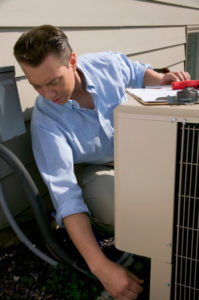 Always know the typical AC life span in a climate as hot and humid as ours. It can help you plan ahead for its eventual replacement. There are three conditions that indicate how it’s performing. These include its electrical consumption, age and its ability to remove humidity from the air.
Always know the typical AC life span in a climate as hot and humid as ours. It can help you plan ahead for its eventual replacement. There are three conditions that indicate how it’s performing. These include its electrical consumption, age and its ability to remove humidity from the air.
Life Span of an AC System
- Energy usage – Are your electric bills climbing for no discernible reason during the summer? It may be a sign that your cooling system is reaching the end of its life. As these systems wear, they use more power. Having the system professionally cleaned and adjusted can help you cut its energy usage, but if you don’t notice a difference in consumption after the tune-up, the air conditioner may be failing.
- Age – The average life of a well-maintained air conditioner is approximately 15 years, but as these systems reach the 10-year mark, they can begin to lose efficiency. Cooling technology has improved substantially in the last few years, so it often makes more sense for homeowners to replace an older system rather than repair it. Even though the replacement is an investment, it will pay for itself in lower electric bills.
- Humidity – A system that leaves more humidity behind can indicate that the unit is reaching the end of functional life. If your cooling system has always run in short cycles, it’s probably over-sized for your home—another sign that its life span will be shorter. A system that’s too big cools your home too fast, leaving less time during the running cycle to remove humidity. Not only does this leave you less comfortable, it’s hard on the parts. They use the most energy when they first start, which creates wear on the parts.
Air Conditioning Systems
It’s typical for an over-sized system to require more repairs and a sooner replacement. Before they’re replaced, you should insist on a load calculation for your home that will give you the precise size the new system needs to be.
To learn more about air conditioner life span and maintenance, contact Byrd Heating and Air Conditioning. We’ve provided outstanding HVAC services for Savannah area homeowners since 1986.

